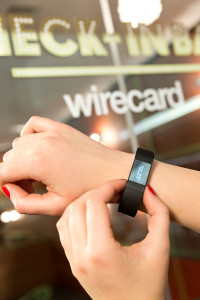 There’s a German company called Wirecard that’s active in the payment business, similar to PayPal. It has its own payment network, issues cards, and is active in mobile payments. GigaOM is reporting that Wirecard is planning this summer to release its own smart band to act as a credit card replacement.
There’s a German company called Wirecard that’s active in the payment business, similar to PayPal. It has its own payment network, issues cards, and is active in mobile payments. GigaOM is reporting that Wirecard is planning this summer to release its own smart band to act as a credit card replacement.
It’s a segment that’s starting to get crowded. Apple Pay has made the most impact in the United States, although it’s not available yet in Europe and won’t work with many terminals here in the US. Like the not-yet shipping Coin and Plastc (as well as LoopPay, which we’ve been trying with considerable success), users load their credit card information into the band and transmit card information to a POS terminal.
Coin and Plastc are card substitutes that require swipes; LoopPay and Apple Pay are contactless, as is Wirecard. But where LoopPay essentially fools a POS terminal into thinking it’s seen a card swipe, Apple Pay and Wirecard use tokenized card numbers — a much more secure solution. Wirecard differs from Apple Pay by following a standard called HCE (Host Card Emulation), which is backed by Google, Visa, and Mastercard. One would expect that Wirecard’s band would work wherever Google Wallet would, had retailers not given up on it.
Another way that Wirecard may win in this market is that it’s a whitebox operation that runs its own payments network, allowing it to help drive adoption across the retailers that already use the Wirecard back end.
Note that this will, for the foreseeable future, be a Europe-only solution, as Wirecard has no presence or banking license in the United States.